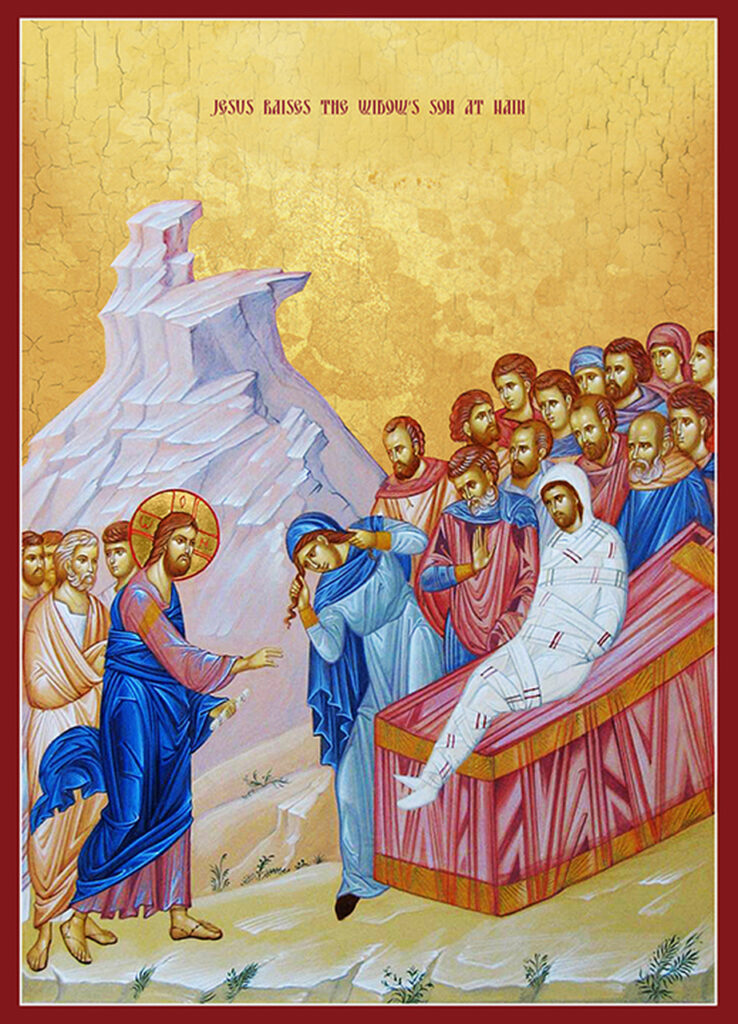In the name of the Father, and of the Son, and of the Holy Spirit, one God, Amen.
A widow, dear brothers and sisters, is one who has lost her husband, lost the target of her love. And we see here, in today’s Gospel reading, the Widow of Nain. She has now lost not only the target of her love but she has lost her only son: the life which she has born as the fruit of the love for her beloved has died. And in the world of the first century, as for most of human history, in this state she is alone and destitute.
I, too, am alone and destitute, for I have lost the target of my love, I have lost God; in my life I have made the Lord a periphery character rather than my heart’s desire. And in this state I, as the Widow of Nain, have lost the hope of eternal life. Another had been through such turmoil, such pain, our Father Abraham. He had placed his love for the Lord in another person—in his son Isaac, the son of the Promise—rather than in the living God. His love was now misplaced. For it is right to love another, to love our children, but the Lord explains the greatest commandment to be “You shall love the Lᴏʀᴅ your God with all your heart, with all your soul, and with all your mind, … [and] You shall love your neighbour as yourself.” (Matthew 22:37, 39) Love God first, then others.

Abraham had forgotten his first love (compare Revelation 2:4). Yet the Lord was able to bring him back by asking Abraham to place all his faithfulness in God, to return again to his first love.
Take now your son, your only son Isaac, whom you love, and go to the land of Moriah, and offer him there as a burnt offering on one of the mountains of which I shall tell you.
Genesis 22:2
Abraham comes to himself, places God again as the first love in his life, and his son Isaac is restored to him.
Do not lay your hand on the lad, or do anything to him; for now I know that you fear God, since you have not withheld your son, your only son, from me.
Genesis 22:12
And now in Nain, “Behold, the Bridegroom comes.” (Apolytikion of Bridegroom Matins) He who is the target of the love of the Widow has visited his people. And as God restored Isaac to Abraham so is the son, by another miracle, restored to the Widow. And I too, in my destitution and misery, if I ask for, if I seek, if I knock on the door of the Bridegroom—if I restore God as the focus of my love—I will receive the Lord, I will find my heart’s desire, I will have the doors of the Kingdom opened to me (see Matthew 7:7–8).
My dear brothers and sisters in Christ, let us set the Lord first in our lives. Then, as we heard from the Apostle a few moments ago, God will say to us, “I will live in them and move among them, and I will be their God, and they shall be my people.” And we, as the people of Nain, will cry out all the louder, “God has visited his people!”
To our incarnate, crucified and risen God and Saviour, Jesus Christ, the Bridegroom of the Church, be all glory, honour and worship, together with his Unoriginate Father and the All-holy, Good and Life-giving Spirit. Amen.
Brethren, you are the temple of the living God; as God said, “I will live in them and move among them, and I will be their God, and they shall be my people. Therefore come out from them, and be separate from them, says the Lord, and touch nothing unclean; then I will welcome you, and I will be a father to you, and you shall be my sons and daughters, says the Lord Almighty. Since we have these promises, beloved, let us cleanse ourselves from every defilement of body and spirit, and make holiness perfect in the fear of God.
— Second Corinthians 6:16–7:1
At that time, Jesus went to a city called Nain, and his disciples and a great crowd went with him. As he drew near to the gate of the city, behold, a man who had died was being carried out, the only son of his mother, and she was a widow; and a large crowd from the city was with her. And when the Lord saw her, he had compassion on her and said to her, “Do not weep.” And he came and touched the bier, and the bearers stood still. And he said, “Young man, I say to you, arise.” And the dead man sat up, and began to speak. And he gave him to his mother. Fear seized them all; and they glorified God, saying, “A great prophet has arisen among us!” and “God has visited his people!
— Luke 7:11–16
